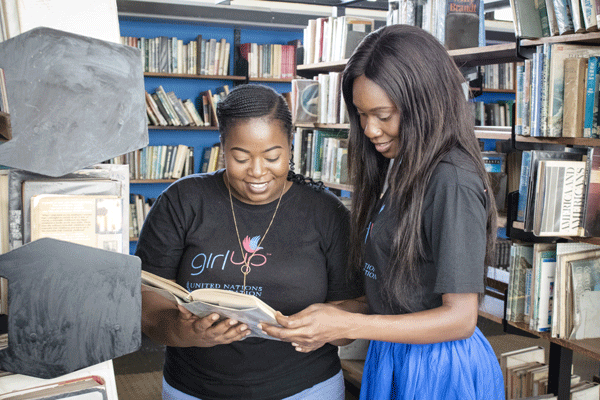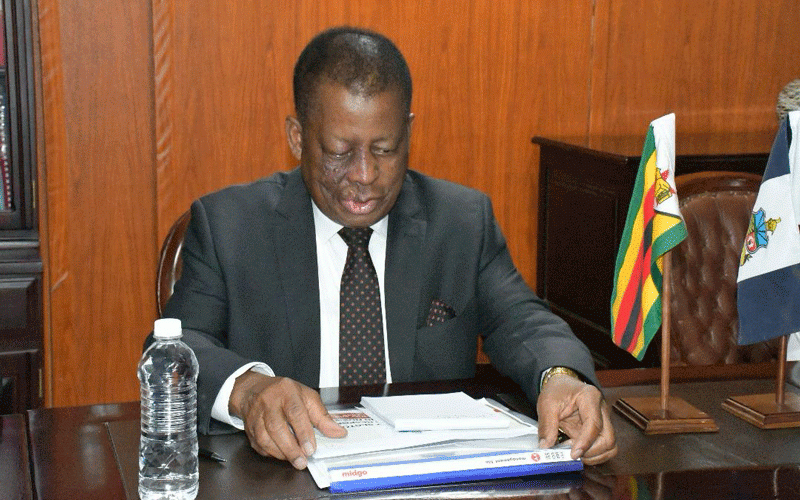
BY Grant Moyo
AUnited Nations Foundation campaign that advocates for the rights and empowerment of adolescent girls, Girl Up, is providing sustainable solutions to the challenges that girls face on a daily basis.
The campaign, which was brought to Zimbabwe in 2018 through the help of its local community president Nyasha Muzadzi, continues to support United Nations programmes promoting the health, safety, education, and leadership of girls in developing countries.
Founded in 2010 by the United Nations Foundation, Girl Up is a global community of passionate advocates that are changing policies and raising funds to support United Nations programmes in an effort to empower girls with different skills.
Locally, Girl Up Zimbabwe aims to ensure that more girls take up leadership roles and get into science, technology, engineering and mathematics (STEM) since they are part of the largest youth generation in the country and beyond.
“There are 600 million adolescent girls in the world and it is imperative that their rights and well being is protected, Girl Up strives to do that. As the community leader of Girl Up Zimbabwe, my duties include implementation and analysing projects, monitoring and evaluating development of the campaign in Zimbabwe as well as providing sustainable solutions to the plight of adolescent girls,” Muzadzi said.
“At this point we are doing advocacy work around STEM. We go around teaching and encouraging girls to take up subjects that are labelled as ‘boys’ subjects’, namely science, physics and biology, to mention but a few. We strive to remove stigma and gender bias in regard to employment in the construction and engineering industry.”
The local campaign runs with the mantra that “girls are powerful when they are educated, healthy, safe and counted”, and this has been ensured in all their projects.
- Chamisa under fire over US$120K donation
- Mavhunga puts DeMbare into Chibuku quarterfinals
- Pension funds bet on Cabora Bassa oilfields
- Councils defy govt fire tender directive
Keep Reading
It is taking strides in offering leadership programmes, engaging girls from suburbs like Epworth and Mbare as well as in schools like Dominican Convent in Harare. They have done workshops in various parts of Harare to teach girls how to make reusable pads as a sustainable solution to ending period poverty.
“As an organisation we recognise the importance of providing girls’ and women with skills. We train them to be confident enough to become leaders in their schools and communities. But the harsh economic conditions that are currently prevailing in Zimbabwe have seen most issues affecting girls being ignored or not receiving the attention they deserve,” Muzadzi said.
“Period poverty has become an issue and the high cost of sanitary wear is negatively impacting on girls. Unfortunately, in the 21st century we are still advocating for the price of pads to go down when we should be making sure girls are educated, getting into STEM and taking up leadership roles. If condoms are free, why not pads? After all it is a choice to have unprotected sex but natural for a female to have her periods.”
As part of its noteworthy campaigns, Girl Up Zimbabwe teaches girls in foster care homes about their sexual reproductive health rights and actively participate in online advocacy against gender-based violence as well as teenage pregnancies.
The organisation offers counselling services to victims of abuse and they have a team of experts in their committee which assists girls encountering any form of difficulty. Before the Covid-19 outbreak, the local campaign was running a book drive in order to build a community library for girls.
The initiative will commence after the lockdown so that they continue to foster a culture of reading and learning for girls.
“We have been working thoroughly, doing social media advocacy with the assistance of influential women like Fungai Ndemera, Vimbai Mutinhiri and Adiona Chidzonga,” Muzadzi said.
“The idea to have the Instagram live sessions was to create a conducive platform that allows us to come together as women and raise the issues on how Covid-19 has affected girls or how it has escalated the problems that they have been facing before. For every problem raised we came up with solutions on how we can overcome these problems caused by this pandemic.
“The live sessions were very informative and issues raised included the social as well as psychological impact of school closure on girls and young women, coming up with relevant strategies to reduce teenage pregnancy and gender-based violence, catch-up strategies when schools re-open, and advise on how girls as well as women can cope with mental health struggles or depression during and after the lockdown. We also discussed issues pertaining to how the world is being forced into the digital space and if we are ready as a country.”
She noted financial constraints to reach out to girls in remote areas as a major challenge since Girl Up programmes are self-funded. To overcome these challenges, the organisation constantly hosts fund-raising events to raise money for projects that they can support girls in different ways.
Girl Up Zimbabwe is certainly supporting United Nations programmes, bringing much-needed change in the lives of the vulnerable girls in different communities.
If individuals collectively create a gender inclusive world, it will help adolescent girls to fully realise their potential and confidently take up social as well as economic space.
l Grant Moyo is a prolific writer, innovative media personality, entrepreneur and a creative artist who is passionate about using his creative mind for the betterment of society. Follow him on Twitter: @TotemGrant.











